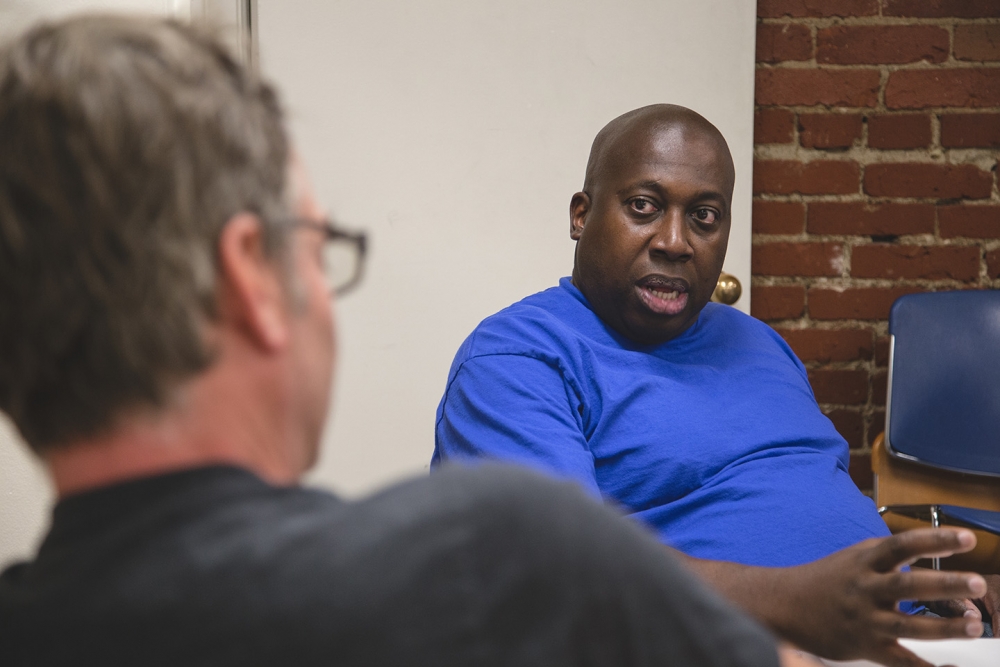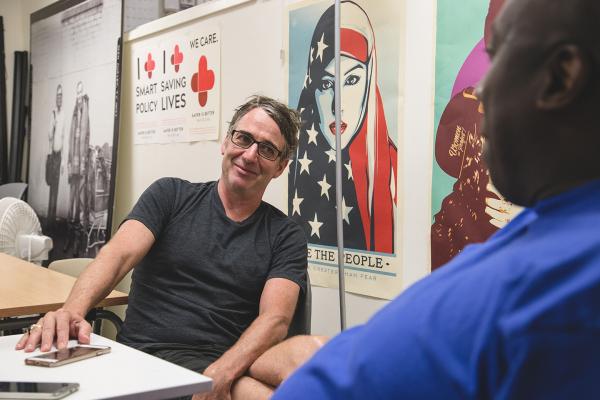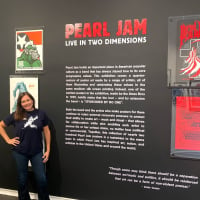Stone Gossard talks Home Shows, homelessness with Real Change vendor
When I was asked by Aaron Burkhalter, the former editor at Real Change, if I was willing to interview a member of the legendary Seattle band Pearl Jam, I told him that I would be glad to do the interview.
I am a Pearl Jam fan but more importantly, I understand the impact they have had. Over a decades-long career, the group has been inducted into the Rock & Roll Hall of Fame, donated millions to their foundation and of course, given voice to some of the most important issues of our society.
Earlier this year the band announced they planned to perform in Seattle for the first time in five years. The two shows, dubbed The Home Shows, were being held to unite the community around the cause of ending homelessness. The band has pledged $1 million to local organizations combatting homelessness and hopes that they will be able to up that figure to $10 million.
Recently, I interviewed Stone Gossard, Pearl Jam’s guitarist. He talked to me about how excited he was to be doing some upcoming concerts, designed to bring awareness to and start conversations about Seattle’s growing homeless population.
I hope you enjoy the Q & A; I found it very insightful.
Darrell Wrenn: Thank you so much for coming out. I’m a huge fan.
Stone Gossard: I’m a huge fan of Real Change, too!
DW: I appreciate that! I think it’s huge, whenever you see
people, you know, artists like you, come in and want to have an impact.
I’m all about making a difference. So what inspired you to get involved
with the homeless crisis here in Seattle?
SG: I think there
are two specific things. The first is just the specific… the real
obvious, evident, visceral experience of seeing it and experiencing it
on a daily basis. Just seeing people standing at the end of freeway
ramps, hanging out in the streets, sleeping in their cars, sleeping
wherever. I don’t think you can be in this city and not be taking that
information in and kind of going, “wow.”
It’s different than it was five years ago. It’s certainly different than it was 20 years ago. And there’s a real specific thing that’s going on. It’s related to economics and an emergency situation with people not being taken care of.
I think, also, on a personal level, the thing that’s impacted me the most was meeting a homeless person who became a friend about 10 years ago.
I met a guy named Dee when I was walking my dog every day. He was living in a tunnel. He was there every morning and we just started talking and we became friends. I’d bring him a little money every once in a while. I’d bring him blankets when it was cold. I watched him go through, you know, full winters and summers, living outside.
DW: Oh wow. Ok.
SG: During that time, I was
talking to him, kind of asking if we could get him inside. And he’d
always say, “I don’t want to go to shelter. I don’t want to deal with
anybody.”
I knew he had some mental health stuff going on. And I remember asking him about it, once we got to know each other better, about who else would come talk to him. And he said that DESC [a Seattle organization that helps homeless and recently homeless individuals] would come out and visit him.
That was a big moment for me, realizing that the DESC was out there meeting with people and connecting with people. And for him to kind of tell me that … if there was going to be anyone to help him, those were going to be the people. That really inspired me and got me supporting the DESC and wanting to recognize who is on the front lines of what’s going on.
Over the course of four years, before he decided to move inside, I got to know him pretty well. Eventually…he went down to check out his options and he’s now been living in [transitional housing] for three years.
This is all over the course of a decade. And what knowing him helped
me see was the complexity and the reasons that someone may not want to
or be able to go into a shelter. You know, the intense pressures …
Comments
-
 Pearl Jam’s Stone Gossard is interviewed by Real Change vendor Darrell Wrenn (right). Photo by Matthew S. Browning
Pearl Jam’s Stone Gossard is interviewed by Real Change vendor Darrell Wrenn (right). Photo by Matthew S. BrowningDW: And the stigma.
SG: And the stigma of it! And, you know, he felt more secure where he was than in a shelter. He probably had more privacy. But also, how difficult it is to navigate getting somebody to get inside.The friendship that I had with him — I still see him periodically — he’s a great guy but really needed a lot of help. But he’s stable now and has a spot. And that was a big moment for me to go like, “this is a tough thing, but it’s also doable.”
DW: Kudos to you for building a relationship with someone. Now, what’s been the response to the Home Shows?
SG: I think, overall, most people are excited that we’re putting a spotlight on something that, clearly, again, most people in Seattle know that it needs to be addressed.We could just do the show and that would be fine, but over the years, we’ve usually given away almost all of the money that we’ve made here locally on our Home Shows, to our foundation or different charities.
So, this was one where we said, “let’s definitely do something different.” And overall, the response has been positive.
DW: It’s a sold-out show. Two shows. Congratulations!
SG: Thank you! But you know, it’s … we’re going raise some money with this show. And there’s going to be some alignment with this show. And there’s going to be a lot of people who are going to speak to each other who haven’t spoken to each other. There’s going to be some opportunities that this show is going to create. But this show is not going to do anything major.Nothing’s going to change unless the momentum from this show continues in the form of, you know, political pressure being applied … and for the nonprofit world, the corporate world, people in Seattle, to all sort of look at the overarching picture and define a plan that is really going to go places.
DW: Well, the show will, like you said, get people talking to each other who maybe wouldn’t talk to each other. And if the show can change somebody’s mindset or spirit who has access to resources who can help the homeless crisis, then the show is already impactful.
SG: Yeah. There’s a lot of communication going on. A lot of our partners are emailing about it. We’ve had a lot of volunteers sign up. So there’s been a great response.DW: Do you think, in the city of Seattle and the state of Washington as a whole, people in positions of power are doing enough to resolve the homeless crisis?
SG: I think that everyone wants to resolve it. I don’t see people fundamentally not wanting to resolve it. I just see it as — and this is coming from somebody who doesn’t have a lot of experience in government or a lot of experience in anything other than being in a band — everybody having to get a lot more serious about it and having to really make compromises. There’s got to be some new alignment that allows a new energy and a new perspective.That’s one of the things we’ve been hoping that we could do, because it’s so easy for us to get a spotlight. We may not have all the answers, but we’re going to throw out this issue and we’re going to try to bring as many people as we can.
But [people] need to get together and start to work it out with each other…
I’ve heard over and over again, anecdotally, that there are opportunities for the city and the county to align with each other and, if they did, I think that would signal opportunity. And if the city and the county were on the same page, and we get the nonprofit world backing the plan, you’d have the political will to really do something and pay for what needs to be paid for.
There’s going to need to be sacrifices. We’re going to have to revisit taxes. Everyone needs to kick in. Rich folks like me need to pay.
There’s going to need to be sacrifices. We’re going to have to revisit taxes. Everyone needs to kick in. Rich folks like me need to pay.
DW: Have any recording artists reached out to you? Wanting to get involved?
SG: I haven’t heard any yet, but we’re not asking anyone to. We don’t have an opener that night. It’ll just be three hours of Pearl Jam. It’s going to be a long night.0 -
 Stone Gossard plays in London on July 17. Photo by Rob Skinner
Stone Gossard plays in London on July 17. Photo by Rob SkinnerDW: Are y’all playing the catalogue? The classics?
SG: Oh yeah. There’s going to be a lot of variety for you.DW: Yeaaaah! So, you’ve expressed that you admire Real Change…
SG: I do! I think it’s outspoken politically and I think that’s part of the fire. That’s what people want to read. They want something that expresses a real perspective from this population. It should be aggressive. I also think that it’s effective. You guys have created this incredible vehicle that incorporates communication, self-empowerment, community … all these elements that everybody is saying we need to do. And you’ve been doing and have been doing it for a long time. And that’s one of the reasons I want to highlight what you’re doing with our event. Because the lesson is right here.DW: Wow, thank you. OK, how has the music industry changed since you started playing?
SG: Well, I think the biggest change is gonna be the internet and people being able to have all of their music on one device. We were in the old world of music and we were able to cross into the new world. We were at the right place at the right time.DW: What inspires your writing? Has the homeless issue inspired you at all?
SG: It definitely has. One of our biggest songs of all time, it’s called “Even Flow,” and it’s a story about us when we were writing songs up in Belltown [a Seattle neighborhood] in 1989 and we used to see this guy every day. I think it does influence us.I’m a tinkerer. I love picking on my guitar. I’m not a trained musician, so I’m still doing the same thing I was doing in high school—
DW: You’re not a trained musician?! And you’re in the Rock & Roll Hall of Fame?
SG: Ha! Yeah, I’m the luckiest guy in rock, I’m telling you. I can play our songs and I can work things out. But it comes from tinkering. It comes from picking something up in high school when your friends are like, “you gotta be in a punk rock band because that’s how good things happen” in 1982, 1983. All my friends were getting into rock and heavy metal and the joy was only playing a few chords and being really loud and not really listening to what anyone else said. And that … that was the first thing that really inspired me.DW: Listen, man, it’s been a pleasure.
Hanna Brooks Olsen, Real Change Interim editor: Can I ask one more question? I feel like, as you’re doing all of this work on homelessness, but you’re moving in the world of artists and people with means … does it come up? Do you talk to people about it? How do you approach that topic?
SG: I think us doing this show gives me the opportunity. They hear about it, they ask me about it. That’s the easiest way. But I also just think that … I hope that there are some ideas that come from these shows. Things that follow that allow Seattle to take one more step toward being real with what we need to do. [Pearl Jam] isn’t going to solve anything, but we’re going to add additional pressure. And eventually pressure builds up and things can change.Check out the full Aug. 8 - Aug. 14 issue.
Real Change is a non-profit organization advocating for economic, social and racial justice. Since 1994 our award-winning weekly newspaper has provided an immediate employment opportunity for people who are homeless and low income. Learn more about Real Change.
0 -
Love stone!IG and twitter - @jacquelynincali
1994 - Bridge School Benefit, Shoreline Mountain View CA
*** 1995 - 2015 High School, College, Broke, Having Kids***
2016 - Temple of the Dog, Bill Graham Civic Center Auditorium, San Francisco CA
2017 - Eddie Vedder, Bourbon and Beyond, Louisville KY
2018 - The Home Shows, Show 2, Seattle WA
2019 - Eddie Vedder, Ohana Fest, Dana Point CA
2020- Oakland Nights 1 and 2
2020 - Ohana Fest
2021 - Ohana Fest
2022 - Oakland 1 and 2
"Watch out for music. It should come with a health warning. It can be dangerous. It can make you feel so alive, so connected to the people around you, and connected to what you really are inside. And it can make you think that the world should, and could, be a much better place. And just occasionally, it can make you very, very happy." -Peter Gabriel0 -
I concur! Love Stone!Oh please let it rain today.
Those that can be trusted can change their mind.0 -
-
Does anyone have an extra copy of this magazine?
0 -
Stone talks Home Shows with 'Real Change'
Stone Gossard talks Home Shows and homelessness with 'Real Change' Newspaper vendor
0 -
-
Fund 5 Mobile Pit Stops in 2020 City Budget
Real Change's campaign "Everybody Poos" seeks to secure funding for 5 Mobile Pit Stops in the 2020 City Budget.
Seattle has an abysmal record of providing public toilets for everyone. We need to fund an intervention that will make our public areas more clean, welcoming, and sanitary.
PLEASE TAKE ACTION AND TELL THE CITY COUNCIL TO FUND 5 MOBILE PIT STOPS IN THE 2020 BUDGET
0 -
"I walk the U District as a social worker, working with folks who need help. It's hard to have to buy a coffee every time I need to use the bathroom on a social worker's salary."
"My period started and I was at a Walgreens. They wouldn't let me use the bathroom. Had to find a bathroom downtown. Had to go home on the bus dirty and felt embarrassed."
These are just two of the stories Real Change News has collected from folks who needed to use a toilet when out and about in Seattle. This is an issue that everyone can agree on. We need more public toilets in the city of Seattle. Next week, the Chair of the Budget Committee will release her budget. It is very important that City Council hears from us this week about the need to fund 5 Mobile Pit Stops in the 2020 City Budget.
Over 200 emails have been sent to the City Council urging them to fund this program. Let's make it 300 this week! Please take one minute to send an email to the City Council urging them to fund 5 Mobile Pit Stops: pj.lnk.to/RealChange2020Fp
0 -
I will say that last year when visiting Seattle for the home shows it was very frustrating trying to find a bathroom. I guess because of the homeless situation everywhere has locks on the bathroom doors that you have to get a code after buying something to access it.
0 -
-
-

0 -
Categories
- All Categories
- 149.2K Pearl Jam's Music and Activism
- 110.3K The Porch
- 286 Vitalogy
- 35.1K Given To Fly (live)
- 3.5K Words and Music...Communication
- 39.4K Flea Market
- 39.4K Lost Dogs
- 58.7K Not Pearl Jam's Music
- 10.6K Musicians and Gearheads
- 29.1K Other Music
- 17.8K Poetry, Prose, Music & Art
- 1.1K The Art Wall
- 56.8K Non-Pearl Jam Discussion
- 22.2K A Moving Train
- 31.7K All Encompassing Trip
- 2.9K Technical Stuff and Help





